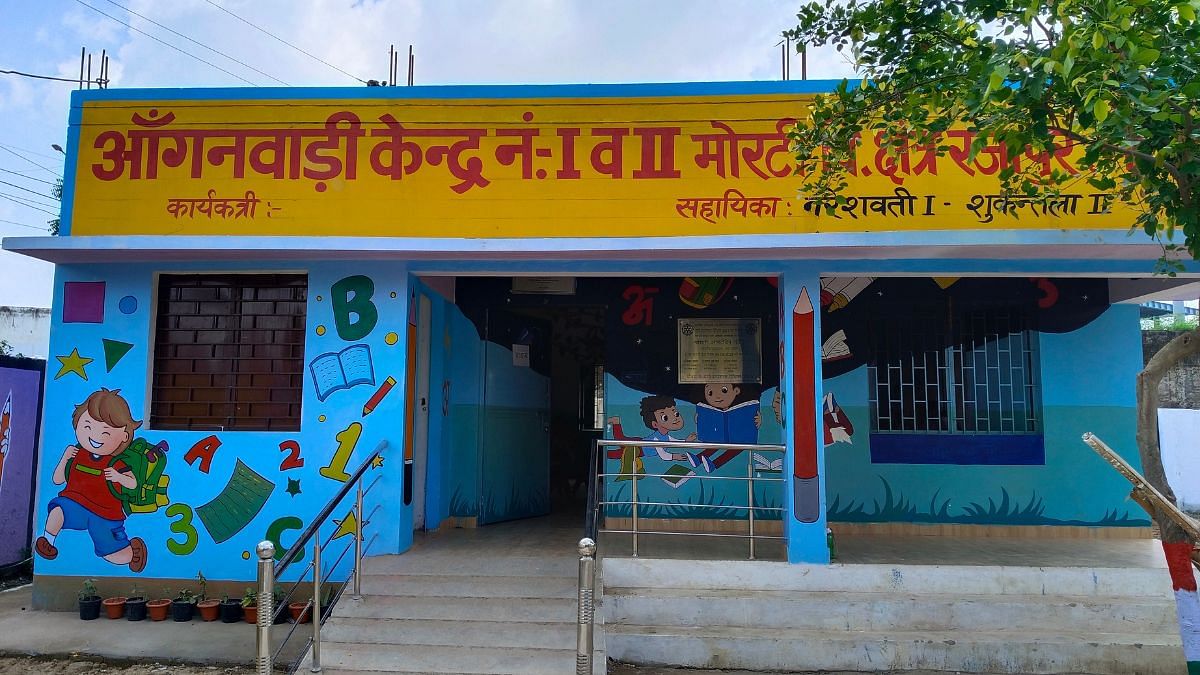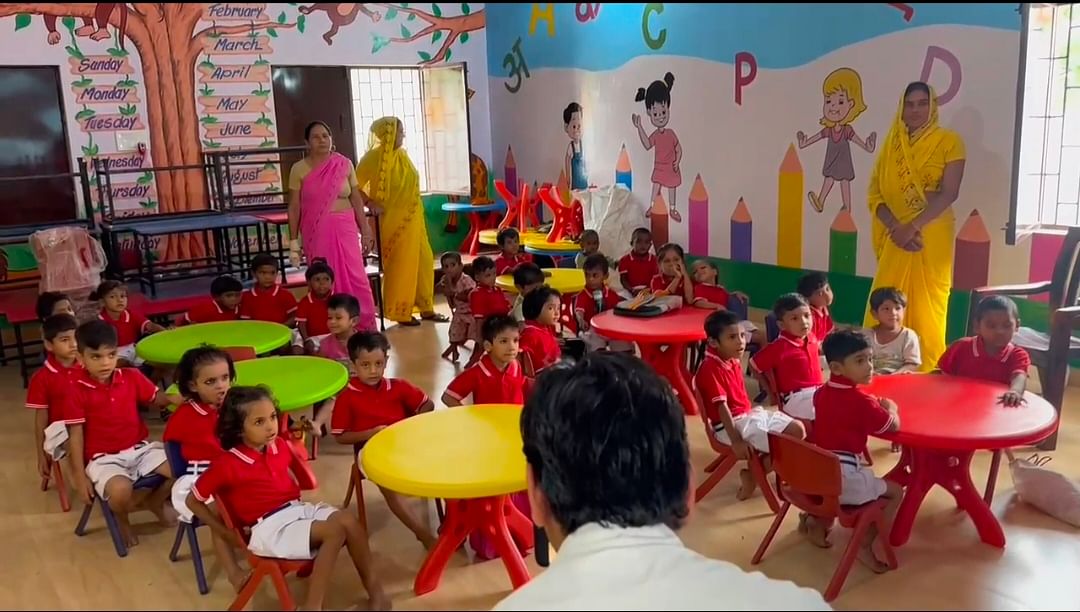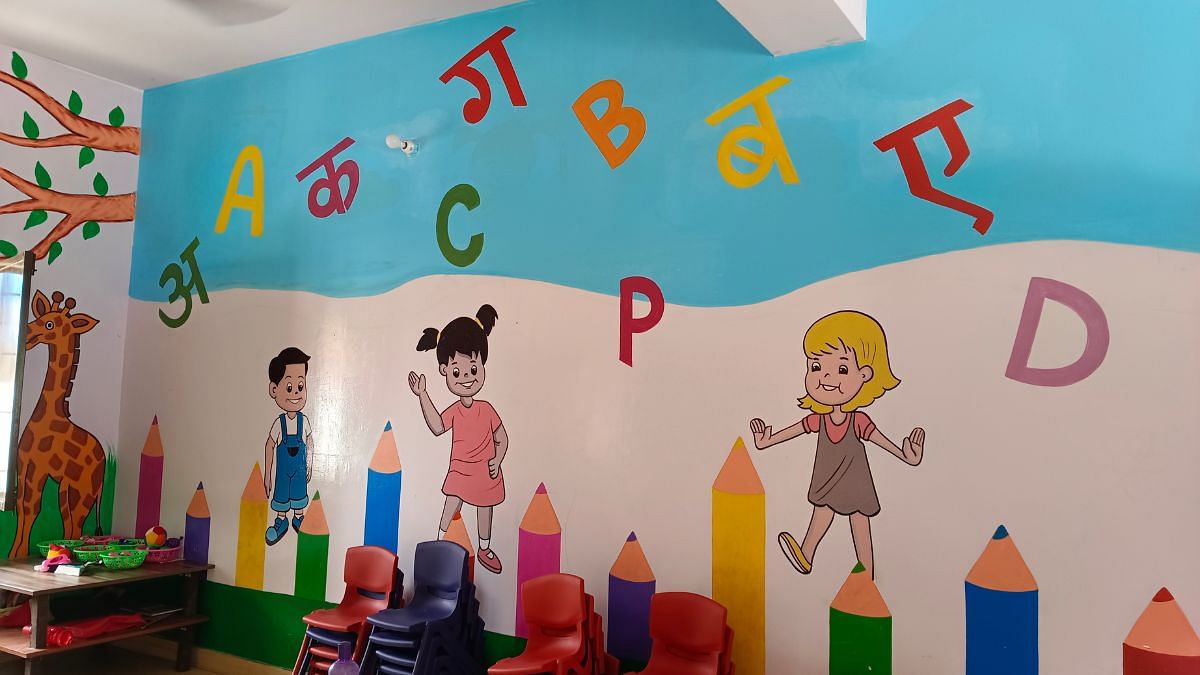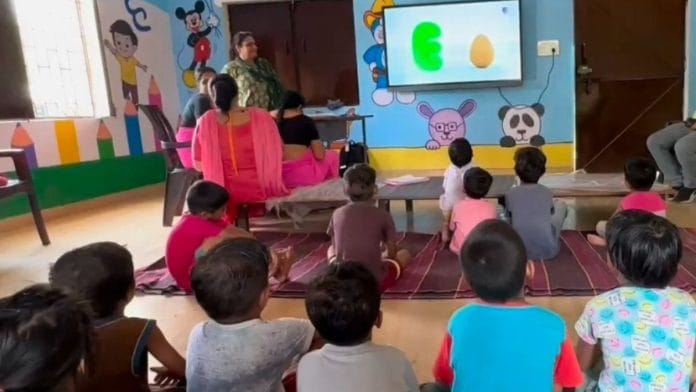Ghaziabad: A teacher powers up a digital screen that dominates one wall of a bright classroom. The children—all between the ages of three and six—perk up. On the screen, an animated apple pops up from a box, and the children sing, “A is for Apple”. This is not a posh private school, but an Anganwadi in Ghaziabad’s Morti village that’s using technology to improve classroom attendance and learning outcomes.
Across India, parents may be trying hard to minimise their children’s screen time, but here in this Anganwadi, the digital board has become a big pull factor. It’s part of an ambitious plan to digitise Ghaziabad’s Anganwadis, one classroom at a time.
Touted as ‘India’s first AI-enabled Anganwadi‘, which was sponsored by Rotary International District 3012, it’s become the talk of the town. While it isn’t truly AI-based, everyone in Morti—from parents to students—wants to know more about the blackboard at Anganwadi Centre no 1 and 2 that seems to talk to them. Within seven days since it was rolled out, attendance has already increased from 35 to 42.
“In the last one week, not a single student has come late to the centre. We also got eight new admissions in just six-seven days,” said Sharda, the child development and project manager in Ghaziabad.
Where once helpers would knock on doors to get children to the centre, now parents are bringing them ahead of time. The digital board has made teaching and learning fun.
Through short modules that can be accessed via icons on the touch screen, students can learn basic concepts in Hindi, English and Mathematics as well as general knowledge.
“C is for cat,” four-year-old Shrishti shouts out, and jumps up with her friend even before the image appears on the screen.

Bright new classrooms
To welcome the smart blackboard, the entire Anganwadi was given a makeover. The newly painted walls of the colourful classroom now have drawings of children with numbers and Hindi and English letters. There are small red and blue plastic chairs arranged around bright round tables. One wall has a painting of a large tree with several monkeys hanging from its branches, along with the names of the days and months. Everything is new in the classroom.

“In just a few days, our kids have learned so much,” said Neetu Devi, the mother of a four-year-old who attends class at the Anganwadi every day. “When she comes home, she shares the stories. She also insists that we drop her off early so that she doesn’t miss anything.” For Neetu, a homemaker, it’s a welcome change.

The digital screen at the centre displays the monthly activities and curriculum. This system is supported by an app developed by Innogical Innovation Private Limited, which allows for real-time monitoring of the activities and adjustments to the programme through the dashboard, explained Ashutosh Vashistha, founder of Innogical.
Also read: Hundreds fall ill in upscale Ghaziabad society. Residents blame sewer water, owner
Learning with fun
The Rotary Foundation plans to digitise an additional 200 of the 1,300 Anganwadi centres in Ghaziabad within the next two months.
Each centre typically has only two or three helpers who are responsible for caring for the children, teaching them, and managing additional programmes for pregnant women and new mothers.
“Given their numerous responsibilities, the helpers often have very limited time to focus on teaching basic things to the children,” said Prashant Raj Sharma, Rotary District Governor. But with these smart teaching aids, lessons according to the prescribed monthly curriculum and activities are delivered with the click of a button, he explained. “Now, students learn on their own.”
Behind the scenes, the digital screen is much more than a smart learning device. It allows the government to monitor learning outcomes, standardise lessons and keep up with private preschools and nurseries.
“The government and the Rotary Foundation can track various metrics, such as the duration the screen was active, the activities the students engaged in, and which activities were run for the longest time,” said Sharma.
This information is essential to understand what children want to learn, concepts that they find hard to grasp, and so on.
“Earlier, it was difficult to monitor what the children were learning. But now, it has become much easier to keep track of all activities,” said Ghaziabad District Magistrate Indra Vikram Singh.
The governments of Maharashtra and Gujarat have also expressed interest in this project, aiming to transform Anganwadis into more fun and educational environments for children, according to Sharma.
“An achievement of this project is that kids who previously came only for the mid-day meals are now there to learn,” added Sharma.
As five-year-old Kanak was leaving the Anganwadi at noon with her mother, she turned back to glance at the now-blank screen. She tried to ask her mother to stay a little longer, but her mother took her hand, and they left.






